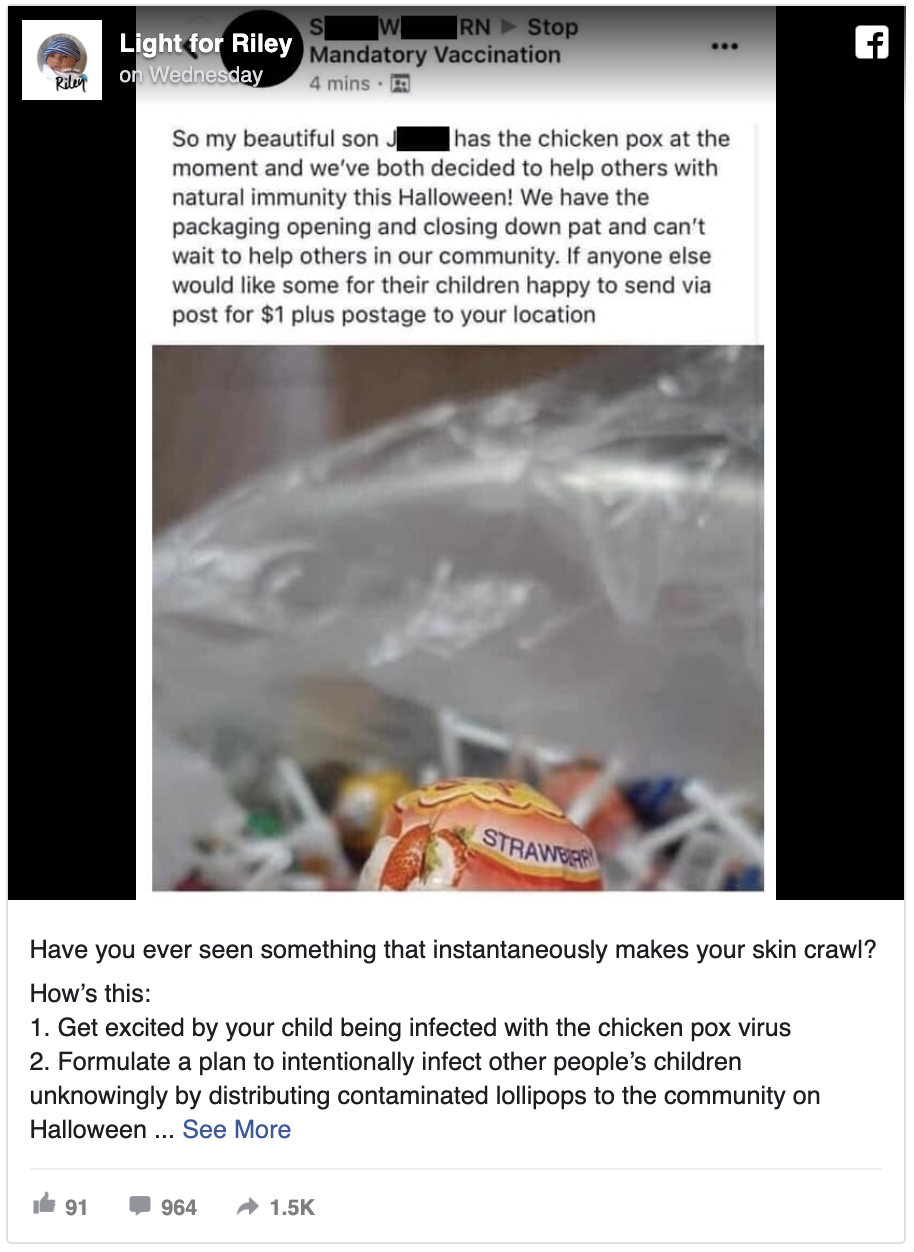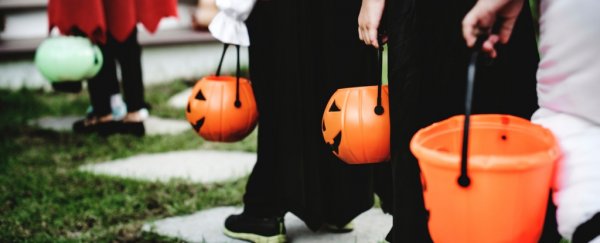An Australian anti-vaxxer mum has reportedly said she was giving trick-or-treaters chicken pox-tainted lollipops for Halloween, claiming the candies would help give kids the infection that her son has so they can get the chicken pox over with and be immune for life, according to a post shared in a pro-vaccine group called "Light for Riley."
On Wednesday the mum, who goes by Sarah Walker RN on Facebook, posted in a private group called "Stop Mandatory Vaccination" that her son recently came down with the chicken pox. She planned to give unwitting trick-or-treaters candy tainted with his germs, Yahoo News reported.
 (Screenshot from Light for Riley/Facebook)
(Screenshot from Light for Riley/Facebook)
"So my beautiful son [redacted] has the chickenpox at the moment and we've both decided to help others with natural immunity this Halloween!" Walker reportedly wrote. "We have the packaging open and closing down pat and can't wait to help others in our community."
Insider couldn't verify whether Walker is an actual person who wrote the post seen on "Light for Riley," or whether she truly did pass out chicken pox-infected lollipops.
But the tale mimics the concept of chicken pox parties, a trend where parents put their healthy children in the same room as a child who has chicken pox in hopes that the healthy children will contract the disease and "get it over with."
The parties were popular before 1995 when a chicken pox vaccine did not yet exist, but there's evidence that these gatherings have made a resurgence in recent years.
Chicken pox parties operate on the premise that most people who contract chickenpox once never get it again, but that doesn't make them safe.
There is no scientific evidence that getting the infection once will boost a person's immunity and it's also impossible to predict how severe a case of the chicken pox will be, even in a healthy child.
Purposefully contracting chicken pox isn't better for your long-term health than getting a vaccine
Anti-vaxxers often say that getting an infection like the chicken pox or measles, weathering it, and healing is the most natural and effective way to prevent the same infection in the future, but there's no science to back up this claim.
It's "incorrect that getting the natural disease is going to make your immunity stronger so you don't need a vaccine, which is a much safer option," paediatrician Dr Natasha Burgert previously told Insider.
"People don't realise that the reason we made vaccines is because they can't kill kids."
Vaccines contain dead or weakened disease germs and have been proven to boost immune systems safely without exposing people to the airborne form of a disease.
Instead of the exposure approach, parents should vaccinate any child who isn't medically exempt. Doing so can help create herd immunity, a concept in which as many people as possible get vaccines in order to protect themselves and other community members who are unable to get vaccines for health reasons, like HIV or cancer.
In many cases, herd immunity has stopped the spread of once-rampant diseases like diphtheria and whooping cough.
It's impossible to know how an unvaccinated child will react to chicken pox
In addition to protecting whole communities, vaccines can protect vulnerable children from potentially severe cases of the chicken pox.
It's impossible to know how severe a child's chicken pox bout will be even if they are healthy, Burgert said.
In addition to the trademark itchy red rash and blistering chicken pox causes, a minor case of the infection can also lead to headaches, a fever, loss of appetite, and extreme tiredness.
In extreme cases, however, an infected person could develop a bacterial infection, pneumonia, brain inflammation, and sepsis, and potentially die, according to the CDC.
"Some kids will just get a few [chickenpox], some will die. You just don't know, so we vaccinate everyone," they possibly can, Burgert said, adding that people who believe a healthy child can just get the chicken pox over with are gambling with their lives.
This article was originally published by Business Insider.
More from Business Insider:
